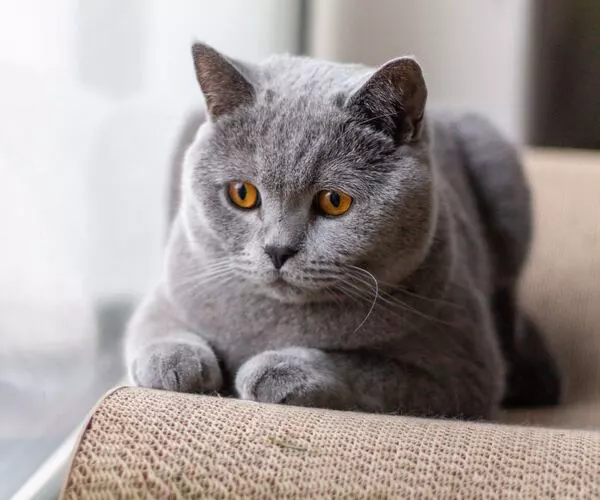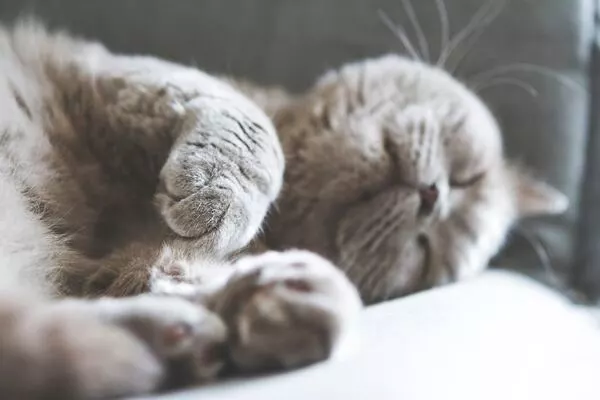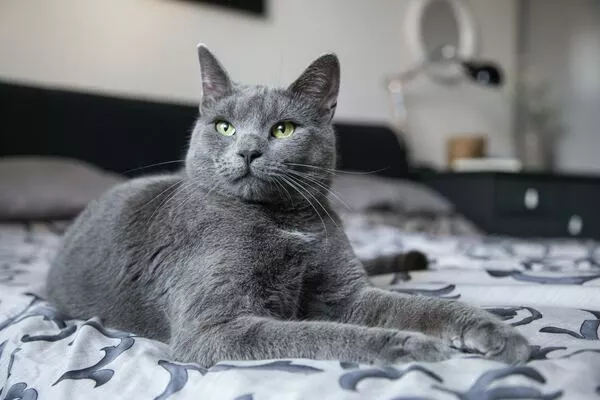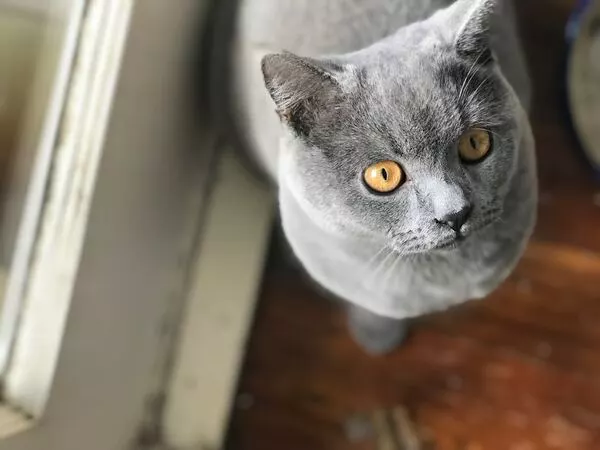British Shorthair cats are among the world’s most beloved breeds, known for their calm yet friendly disposition. While these beautiful pets make wonderful additions to both families and individuals alike, one common worry associated with owning male British Shorthair cats is whether or not they will spray.
Spraying is a natural behavior cats engage in to mark their territory, releasing small amounts of urine onto vertical surfaces such as walls or furniture to mark it as theirs. While both male and female cats may urinate on vertical surfaces, unneutered male cats tend to use spraying more as an indicator of sexual availability and dominance among other cats.
If you’re considering adopting a British Shorthair male, it is essential that you understand their spraying behavior and how best to curb it. In this article we’ll look into whether or not these animals spray, why they do so, measures you can take to stop this behaviour as well as any health concerns or solutions available for dealing with this behavior.
Do males British Shorthair spray?
Both male and female British Shorthair cats that have not been spayed or neutered can exhibit spraying behavior if left intact, using it to mark their territory and assert dominance, which is common among all cats. Staking their claim over an area typically involves leaving scent marks by scratching, rubbing, scratching or urinating on it – something sprayed cats do regularly when left intact.

Key Takeaways
- British Shorthair males can spray to mark their territory and communicate their sexual availability and dominance.
- Neutering can help discourage spraying behavior in male cats.
- If your British Shorthair male is spraying, it’s important to seek professional advice and treatment options.
Also Read:- Are Domestic Shorthair Cats Affectionate?Understanding British Shorthair Males
British Shorthair cats are beloved companions known for their charming personalities, gentle demeanor and loving disposition. Like other breeds of cat, however, British Shorthair cats possess certain distinctive features owners should keep an eye out for; specifically male British Shorthair cats’ tendency to spray. Here we will focus on this characteristic specifically in male British Shorthair cats.
Spraying is an instinctual behavior for cats, with both male and female British Shorthair cats experiencing it if not neutered. Male cats tend to spray more frequently than their counterpart female cats – marking their territory and communicating with other cats via this behavior.

Male British Shorthair cats are well known for their larger size and muscular build. These felines typically weigh anywhere between 4.1 to 7.7 kilograms and stand up to 20 inches tall, boasting thick fur with round faces for an attractive aesthetic cherished by many owners.
Not all male British Shorthair cats spray, and neutering may drastically decrease the frequency of this behavior. Furthermore, providing your cat with a secure environment may help alleviate stress levels and consequently lessen spraying episodes.
Understanding the unique traits of male British Shorthair cats will allow owners to provide optimal care for their furry companions.
Also Read:- Are British Shorthair Cats Good With Dogs?Spraying Behaviour in Cats
Cats are known for their territorial behavior, and one way they mark it is through spraying. Cats engage in this practice by depositing small amounts of urine on vertical surfaces such as walls, furniture, or doors, usually unneutered male cats are most prone to it.

Reasons for Spraying
Cats spray for different reasons, including:
- Marking territory: Cats engage in spraying behavior to establish their territory and communicate to other cats that the area is under their ownership.
- Sexual behavior: Unneutered male cats are more likely to spray as a way of attracting females during mating season.
- Stress: Cats may spray when they feel stressed or anxious. Changes in the household, such as the introduction of a new pet or a move to a new home, can trigger spraying behavior.
- Medical issues: Cats with medical issues such as urinary tract infections or kidney problems may also spray.
When Cats Begins Spraying?
Cats typically begins to spraying at 6 to 7 months old. Many veterinarians advise neutering cats as soon as they reach maturity, which typically happens between four and six Months old.
Prevalence in Males
Spraying behavior among male cats tends to increase when unneutered male cats meets sexual maturity at around six months old, according to PetMD. Neutering may help curb or even eliminate it altogether in these cats; spaying and neutering may still result in spraying behavior if their social and emotional needs are being fulfilled sufficiently.
Spraying in cats is a natural behavior; both male and female cats may engage in this action, although unneutered male cats tend to do it more. Neutering may reduce or stop this practice altogether. Therefore, it is crucial that veterinarians identify why their cats spraying, identify any issues underlying this action, and address these appropriately so as to stop it becoming an ongoing issue.
Also Read:- Can British Shorthairs be Aggressive?British Shorthair Males and Spraying
British Shorthair male cats who are unneutered often show spraying behavior to mark their territory and express dominance, however this behavior can become frustrating for cat owners due to unpleasant odors that remain. We will explore factors which impact spraying behavior among male British Shorthair cats as well as ways to prevent it.

Factors Influencing Spraying
Several factors can impact spraying behavior in British Shorthair males. These include:
- Age: Young cats that have not yet been neutered or spayed tend to spray more often. This behavior increases with their age.
- Gender: Male cats tend to spray more often than their female counterparts.
- Environment: Unfamiliar or stressful surroundings may stimulate spraying behavior in cats.
It is important to note that spraying behavior can also be a sign of a medical issue, such as a urinary tract infection. If a British Shorthair male suddenly starts spraying or if there are any changes in their spraying behavior, it is important to take them to a veterinarian for a check-up.
Preventing Spraying in British Shorthair Males
The most effective way to discourage spraying behavior in British Shorthair males is to have them neutered. Neutering can reduce testosterone levels in male cats, which can decrease their urge to spray. It is recommended to have British Shorthair males neutered at around 6 months old.
Also Read:- At what age do British Shorthair cats reach full maturity?As well as neutering their British Shorthair male cats, there are additional measures owners can take to combat spraying behavior in these cats. These steps include:
- Provide a Clean Litter Box: Cats are naturally clean creatures and will appreciate a well-kept litter box. Be sure to scoop and clean it regularly, at least once weekly.
- Provide Enough Resources: Cats may become territorial when they do not have access to enough food, water, or toys – be sure to provide enough for all cats living within your household.
- Reducing Stress: Stressful situations like adding a new cat to the household or moving to a new residence may trigger spraying behavior in male British Shorthair cats, so strive to create an environment which provides them with safety and comfort.
Through taking these measures, cat owners can discourage spraying behavior among British Shorthair males and ensure a pleasant home environment.
Health Concerns Related to Spraying
Spraying is an instinctive cats’ behavior, but it can also be a sign of health problems. If a male British Shorthair is spraying excessively or in inappropriate places, it may indicate an underlying medical issue. Here are some health concerns related to spraying that British Shorthair owners should be aware of:

Urinary Tract Infections
Urinary tract infections (UTIs) in cats are one of the main sources of inappropriate urination, including spraying. Male cats tend to be more prone than females as their longer and narrower urethra makes it easier for bacteria to enter and cause infection.
Signs of UTI can include frequent urination, straining during urination sessions, blood in the urine, excessively licking their genital area as well as straining when trying to urinate and straining when trying to urinate as well as excessive licking and straining during urination sessions – left untreated they could even progress into bladder stones or kidney disease conditions that will need medical intervention.
Bladder Stones
Bladder stones (uroliths) are hard mineral deposits found within a cat’s bladder that cause pain and discomfort, potentially prompting him to spray outside his litter box more frequently. Male cats seem particularly predisposed to bladder stones due to having longer and narrower urethras that allow more stones lodge themselves within and cause blockage; symptoms associated with bladder stones include frequent urination, straining to urinate frequently and blood in urine along with painful crying during urination; treatment options could range from surgery or diet programs intended to dissolve them away completely.
Stress and Anxiety
Stress and anxiety can also trigger cats to spray. British Shorthairs are typically sensitive felines who thrive on routine, so any changes to their environment – like moving to a new home, the introduction of new pets or schedule changes can become stressors – leading them to spray in response. Signs of distress include spraying, hiding excessive grooming or loss of appetite – which treatments for may include environmental changes like adding more hiding spaces/litter boxes/medication for anxiety reduction.
Hormonal Imbalances
Hormonal imbalances may also prompt male British Shorthair cats to spray. Testosterone, the hormone responsible for marking cats’ behavior, drives this behavior more in intact males than neutered ones – yet even neutered cats with hormonal issues may spray excessively due to imbalanced hormone levels resulting from an imbalanced hormonal environment resulting from symptoms like excessive spraying, aggression or mounting behavior; treatment options could include hormone therapy or surgical removal of their testicles.
Spraying may seem harmless to British Shorthair owners; however, its behavior could also indicate health problems within their cat’s system. They should be wary of possible health concerns related to spraying; seek veterinary help immediately if their cat exhibits symptoms related to urinary tract infection, bladder stones, stress anxiety and hormonal imbalance.
Also Read:- Do British Shorthair Cats Shed A Lot? A Comprehensive GuideSprayed Areas Clean Up
Cleaning the area thoroughly is crucial, yet be wary of using strong chemicals that might encourage your cat to “mark” more often in that spot. I suggest investing in stain and odor removal products like those offered on Chewy as they will likely do their job effectively.
- Redefine the affected areas: Make these areas less inviting for your pet by placing food there or engaging in some form of play with them there. Alternatively, if that’s not feasible, associate these spots with specific activities for them, like feeding time.
- Taking care of the stuff that may cause spraying: Minor changes can cause great distress to cats. You should consider storing new items or those belonging to visitors in their own spaces.
Supplements/Medication
There are also medications available to provide additional assistance, with an array of solutions readily available on the market. Before making a purchase decision, always consult your veterinarian first.

Feliway:
My veterinarian suggested this solution to me to reduce Frank’s anxiety when I moved apartments, so when stress-related spraying occurred. If you are looking for solutions like this one for yourself or a pet you know, plug-ins offer greater cost-efficiency; check prices here if that is an option; I only use spray when taking Frank to his veterinarian appointment due to his anxiety during the three minute car ride.
Certain individuals suggest restricting your cat’s access to windows and doors that provide views or scents of outdoor animals, but I would only advise doing this if absolutely certain it’s necessary. My British Shorthair (BSH) enjoys perching by the window; depriving him this pleasure would cause great distress; instead I frequently join him there and view this time as an opportunity to bond with him.
Frequently Asked Questions
At what age should a male British Shorthair be neutered?
Male British Shorthairs should be neutered between four to six months old. This will help prevent them from spraying and exhibiting other unwanted behaviors.
What is the typical behavior of a male British Shorthair?
Male British Shorthairs are known for being friendly, affectionate, and playful. They are also independent and enjoy spending time alone. However, if they are not neutered, they may exhibit territorial behavior such as spraying.
How can you tell the difference between male and female British Shorthair cats?
Male British Shorthairs are usually larger and more muscular than females. They also have broader heads and a more prominent jawline. Additionally, male British Shorthairs have a more rounded and thicker neck than females.
Are male British Shorthairs more likely to spray than females?
Both male and female British Shorthairs can spray if they are not neutered. However, male British Shorthairs are more likely to exhibit this behavior than females.
What steps can be taken to prevent male British Shorthairs from spraying?
The most effective way to prevent male British Shorthairs from spraying is to have them neutered. This will also help prevent other unwanted behaviors such as aggression and roaming.
Do male British Shorthairs have a tendency towards aggression?
Male British Shorthairs can be aggressive if they are not socialized properly or if they are not neutered. However, with proper socialization and training, they can be friendly and affectionate pets.

Hi, this Sienna Metts, the purr-fect authority in the captivating world of feline wisdom. I live in White Plains, NY. With years of experience in studying and understanding the behavior, health, and unique traits of different cat breeds, I have earned a well-deserved reputation as a feline connoisseur. Through my articles, I’ll be sharing captivating stories, practical advice, and expert tips on topics ranging from breed characteristics, care and eating guidelines to training techniques and holistic health solutions.













